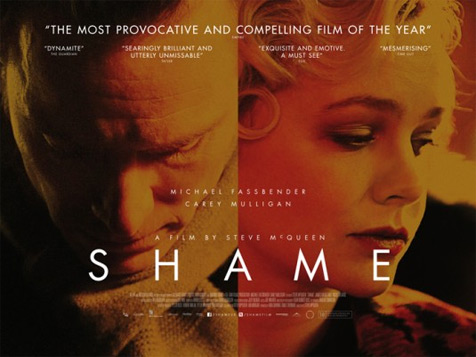When I first watched ‘Hunger’ - the debut feature film from
British artist Steve McQueen - it was hard not to be taken aback by such an
intimate portrait of human extremes and where it did have its flaws (creeping
into artsy pretentiousness), it was a very strong stepping stone to bridge the
gap from art to feature film making. His sophomore feature, ‘Shame’ is a much
more refined piece of film craft that really shows McQueen is definitely a
director to watch out for in the future.
Brandon (Michael Fassbender) is a model citizen of
Manhattan. He’s top dog in his job, he’s charming, well dressed and lives in a
comfortable, modern flat high up in the city. However, he’s also a sex addict -
an addiction he works around in his day-to-day life with calm calculation. But
when his younger sister, Sissy (Carey Mulligan), comes for an unexpected (and
indefinite) visit, his routine is shattered and he is forced to deal with his
addiction.
But to say that this is a film about sex addiction would make it sound like a film that
tried to deal with the issues surrounding it: causes, problems and the effect
it has on Brandon and those around him. This couldn’t be further from the
truth. The causes are only hinted at, the problems it brings aren’t black and
white and the effects are not what we would imagine. Not least because Sissy is
just as damaged as Brandon. So it’s much more like a portrait of people dealing
with their emotional damages and it just so happens that the protagonist we
find ourselves with manifests these damages as a sex addiction.
It’s this emotional quality of the film that is the driving
force of the story, rather than actual plot. Taking place over the course of a
few days, we see slices of Brandon’s life and routine and how once Sissy
appears, the utter contrast between the two characters completely disrupts it.
They are both complete train wrecks of people who have both developed their own
ways of dealing with life. Where Brandon is sophisticated and introverted,
Sissy is impulsive and extroverted. But both of them share a traumatic past
that is never revealed and all we know is that despite being total opposites,
they both share a tragic loneliness. This is most clear during a sequence in
which Sissy sings an original, haunting rendition of “New York, New York” at a
stylish Manhattan bar. The shots are close and editing is minimal and the
emotion is ramped up by the magnificent performances of both actors.
Both Fassbender and Mulligan give the performances of their
careers. The lingering shots of Brandon doing very little other than thinking
are utterly compelling to watch and to see Mulligan playing the total opposite
of her usual quiet, mousy characters is incredibly refreshing. These
performances are emphasised by McQueen’s use of the long take, where emotional
beats of the script change and the performances change with them. The
performances also work in harmony with all visual aspects of the film. Both
characters are seen in reflections, shot through glass or we see the backs of
them. McQueen places the audience in the position of a voyeur, keeping us
visually distant from the characters as they distance themselves from everyone
around them in their own ways. It all comes together to produce a film more
about crushing isolation than sex addiction.
What really struck me about the film was the audience
reaction to when the unflinching and raw sex scenes appeared. There was a lot
of awkward laughter, which was intriguing to say the least - the presentation
of sex as essentially animalistic seemed to make the audience squirm. Believe
me when I say the sex scenes aren’t sexy, not in the traditional Hollywood
sense anyway. There isn’t any sweeping emotional music or rich colours with
glamorous lighting - it’s just pure fucking.
But the question of the laughter is an intriguing one. Maybe
by placing us in a position of voyeurism, McQueen is placing the audience in
Brandon’s position when a work colleague discovers his work computer is full of
porn - that embarrassment of being caught? Or maybe laughing off the sex scenes
is an emotional barrier for the realism involved - we don’t want to admit that
we have sex in such an animalistic and unromantic fashion?
Sounds like an essay topic, I’m digressing a little.
But despite the frank and graphic sex scenes, the real
emotional plight of the film comes from the parts that made the audience laugh
for another reason: seeing two characters having genuinely comic and emotional
interactions - little moments showing that both Brandon and Sissy have the potential
to engage in an emotional relationship with someone, but their debilitating
personalities won’t allow them. That’s what makes this film so ultimately
tragic, yet utterly compelling. It’s a weighty film to watch, but if you see
any film at the cinema this awards season, make sure it’s this one as it’s
worth every single penny you’ll spend on it...
...just don’t bring your parents or first dates with you.



No comments:
Post a Comment